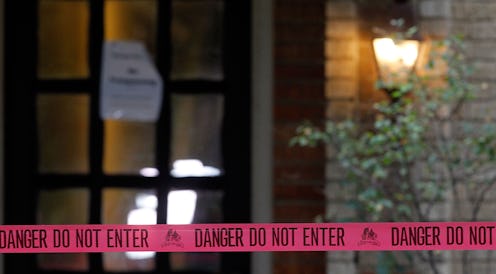News
Connecticut Places Family On Ebola Quarantine
Ebola panic has calmed in the United States since over 60 people who had contact with Thomas Eric Duncan, patient zero, were cleared by federal health officials this week. It's now been a week since a new U.S. Ebola case has been confirmed, and U.S. patients Amber Vinson and Ashoka Mukpo were just given a clean bill of health. Still, government officials are hardly easing up on the highly fatal virus: A West African family is under Ebola quarantine in Connecticut five days after arriving in the United States via John F. Kennedy International Airport in New York.
Although this sounds potentially threatening, let's put a hold on the panic. The New Haven Register reports the West African family didn't show any symptoms of Ebola when they arrived at JFK on Saturday. They were flagged because of their recent travel history from one of the three hardest-hit Ebola-stricken countries in West Africa — officials won't confirm which nation — and will be under monitored quarantine for 21 days.
The family is currently housed in a residential home in West Haven, Connecticut. City Health Director Maureen B. Lillis said the quarantine is on its fifth day, and a police officer has been stationed outside the home. The family members stay in constant contact with state health officials, monitoring their temperatures and reporting them twice daily.
It's unclear whether the family came to the United States from West Africa to live permanently, or just to visit. The Register reports the family is here temporarily, while Reuters claims the family members were "planning to live" here.
Following the death of Duncan, a Liberian national who contracted Ebola in West Africa before boarding a flight to the United States in late September, U.S. health and transportation officials are cracking down on travelers arriving from the Ebola-stricken region. Department of Homeland Security Secretary Jeh Johnson announced on Tuesday that all incoming travelers from Liberia, Guinea or Sierra Leone must pass through one of five designated airports: JFK in New York, Newark Liberty International in New Jersey, Washington Dulles International in Washington, D.C., O’Hare International in Chicago, and Hartsfield-Jackson International in Atlanta. The new rule took effect on Wednesday.
According to The New York Times, those five airports already accounted for roughly 90 percent of travelers from the region. Airlines will now have to reroute other West African passengers to one of these airports.
Although these five airports were already conducting "fever checks" with no-touch thermometers on each incoming passenger from one of the three affected countries, the Centers for Disease Control and Prevention issued new, tightened guidelines on Wednesday. Now, any traveler from Liberia, Guinea or Sierra Leone, as well as American aid workers, government employees and journalists returning from the region, must be placed under 21-day monitoring. These passengers must take their temperatures twice a day and check in with CDC officials.
Considering that travelers already have their temperatures taken prior to leaving West Africa, is this new regulation overdoing it? Federal health officials say the preemptive safety measure should improve the government's response to a possible Ebola outbreak. "We have to keep our guard up," CDC Director Thomas Frieden recently told reporters in a teleconference.
It's also important to note that Ebola can incubate in a person's body for up to 21 days, which means taking a temperature on arrival is not the best indicator of the disease. For example, sources have said Duncan had his temperature taken prior to leaving Liberia; he didn't have a fever, and so he was able to travel to America.The extra safety precaution will only be practiced in the following states, for now: New York, Pennsylvania, Maryland, Virginia, New Jersey and Georgia. Frieden told reporters the CDC plans to expand the 21-day monitoring rule to other states in the near future.Images: Getty Images (3)
